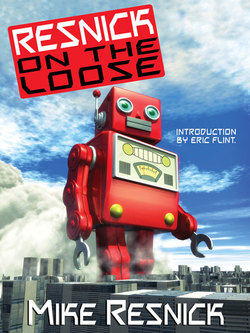Читать книгу Resnick on the Loose - Mike Resnick - Страница 17
На сайте Литреса книга снята с продажи.
ОглавлениеWords Matter
Ever hear of Joe Esterhaus?
No reason why you should. He doesn’t know that Jim Baen’s Universe exists. As far as I know, he’s never read a word of science fiction.
I know about him, though. The reason I know is because he makes over a million dollars a screenplay, and is one of the very few writers, even in an industry that seems to play with Monopoly money, to pull down that kind of fee.
Ever hear of Tom Cruise? Brad Pitt? George Clooney? Harrison Ford? Julia Roberts? Sandra Bullock?
Sure you have. They make ten million or more per film, plus a piece of the gross—and that, of course, has nothing to do with the quality of the film. Film bombs, film makes no sense, film has an IQ that would freeze water (and they’ve all made their share of them), they get their money anyway.
So what does this have to do with science fiction?
Bear with me while I explain.
Recently Carol and I rented some Tales of Tomorrow DVDs from Netflix. That’s a show that was run from 1949 to 1951, starting when we were 7 years old. It was in black-and-white, of course, always performed live (and you wouldn’t believe how many professional actors from Lee J. Cobb on down muffed their lines), and boasted a series of young actors like Paul Newman who became household names.
About one in every seven episodes was pretty good, always allowing for the minimal budget and live performances by unprepared actors. About one in seven was acceptable. And about five in seven were unwatchable.
Moral: if the story is dumb, an actor, no matter how good he is, can’t make it any smarter.
Then we tried Suspense, also from 1949. Another nice batch of actors: kids like Newman and Charlton Heston, established stars like Lili Palmer and Boris Karloff.
Not just bad, but embarrassingly snicker-out-loud bad. Even those brilliant actors couldn’t save it.
Finally, for her birthday, I got Carol a complete set of bootleg DVDs of the fondly-remembered but never-released 2-year 78-episode run of Science Fiction Theater from 1955 and 1956, a time when most purported science fiction movies were actually anti-science and usually ended with lines such as “There are some things man was not meant to know.” Science Fiction Theater was life a breath of fresh air, because it was clearly of the opinion that there is nothing man wasn’t meant to know or learn. Each of these shows was introduced by Truman Bradley, in a state-of-the-art lab (circa 1955) that I would kill to play in. He’d show a couple of related cutting-edge experiments, and then explain that the episode you were about to see extrapolated from the experiments he’d just demonstrated. No stars at all. Probably the biggest names were Warren Stevens and John Howard, a couple of journeyman B-movie actors.
And the shows were pretty damned good. Hell, for the time, they were remarkably good.
And they were good for a simple reason: the producer understood that without a good script, all the stars in the world can’t turn a sow’s ear into a silk purse.
The principle still holds true today. Take a look at the latest Indiana Jones film. Got a huge superstar—Harrison Ford. Got the most powerful director in history—Stephen Spielberg. Got the most successful producer in history—George Lucas. Got a laughably bad script. End result: a laughably bad film.
It was true in 1949, and in 1955, and it’s true today: every play and every movie starts with The Word. You ignore the words and you’d better be making a silent film or a ballet, or else you’re in deep trouble from the get-go. Writers know that; television and movie executives still haven’t figured it out.
Let me close with a wonderful (and true) story:
The great director Frank Capra was giving an interview to a few members of the press back in the 1940s, talking about how he put the famed “Capra Touch” on this scene and that…and finally his screenwriter could stand it no more. He walked over with a ream of blank paper, tossed it on the startled director’s desk, and snapped: “Here! Put this Capra touch on this!”
A lesson worth remembering.
